- Home
- Octavia E. Butler
Bloodchild and Other Stories Page 3
Bloodchild and Other Stories Read online
Page 3
I sat down at my mother’s table, waiting for quiet. The table was smooth and worn, heavy and well crafted. My father had made it for her just before he died. I remembered hanging around underfoot when he built it. He didn’t mind. Now I sat leaning on it, missing him. I could have talked to him. He had done it three times in his long life. Three clutches of eggs, three times being opened up and sewed up. How had he done it? How did anyone do it?
I got up, took the rifle from its hiding place, and sat down again with it. It needed cleaning, oiling.
All I did was load it.
“Gan?”
She made a lot of little clicking sounds when she walked on bare floor, each limb clicking in succession as it touched down. Waves of little clicks.
She came to the table, raised the front half of her body above it, and surged onto it. Sometimes she moved so smoothly she seemed to flow like water itself. She coiled herself into a small hill in the middle of the table and looked at me.
“That was bad,” she said softly. “You should not have seen it. It need not be that way.”
“I know.”
“T’Khotgif—Ch’Khotgif now—she will die of her disease. She will not live to raise her children. But her sister will provide for them, and for Bram Lomas.” Sterile sister. One fertile female in every lot. One to keep the family going. That sister owed Lomas more than she could ever repay.
“He’ll live then?”
“Yes.”
“I wonder if he would do it again.”
“No one would ask him to do that again.”
I looked into the yellow eyes, wondering how much I saw and understood there, and how much I only imagined. “No one ever asks us,” I said. “You never asked me.”
She moved her head slightly. “What’s the matter with your face?”
“Nothing. Nothing important.” Human eyes probably wouldn’t have noticed the swelling in the darkness. The only light was from one of the moons, shining through a window across the room.
“Did you use the rifle to shoot the achti?”
“Yes.”
“And do you mean to use it to shoot me?”
I stared at her, outlined in the moonlight—coiled, graceful body. “What does Terran blood taste like to you?”
She said nothing.
“What are you?” I whispered. “What are we to you?”
She lay still, rested her head on her topmost coil. “You know me as no other does,” she said softly. “You must decide.”
“That’s what happened to my face,” I told her.
“What?”
“Qui goaded me into deciding to do something. It didn’t turn out very well.” I moved the gun slightly, brought the barrel up diagonally under my own chin. “At least it was a decision I made.”
“As this will be.”
“Ask me, Gatoi.”
“For my children’s lives?”
She would say something like that. She knew how to manipulate people, Terran and Tlic. But not this time.
“I don’t want to be a host animal,” I said. “Not even yours.”
It took her a long time to answer. “We use almost no host animals these days,” she said. “You know that.”
“You use us.”
“We do. We wait long years for you and teach you and join our families to yours.” She moved restlessly. “You know you aren’t animals to us.”
I stared at her, saying nothing.
“The animals we once used began killing most of our eggs after implantation long before your ancestors arrived,” she said softly. “You know these things, Gan. Because your people arrived, we are relearning what it means to be a healthy, thriving people. And your ancestors, fleeing from their home-world, from their own kind who would have killed or enslaved them—they survived because of us. We saw them as people and gave them the Preserve when they still tried to kill us as worms.”
At the word “worms,” I jumped. I couldn’t help it, and she couldn’t help noticing it.
“I see,” she said quietly. “Would you really rather die than bear my young, Gan?”
I didn’t answer.
“Shall I go to Xuan Hoa?”
“Yes!” Hoa wanted it. Let her have it. She hadn’t had to watch Lomas. She’d be proud.… Not terrified.
T’Gatoi flowed off the table onto the floor, startling me almost too much.
“I’ll sleep in Hoa’s room tonight,” she said. “And sometime tonight or in the morning, I’ll tell her.”
This was going too fast. My sister Hoa had had almost as much to do with raising me as my mother. I was still close to her—not like Qui. She could want T’Gatoi and still love me.
“Wait! Gatoi!”
She looked back, then raised nearly half her length off the floor and turned to face me. “These are adult things, Gan. This is my life, my family!”
“But she’s … my sister.”
“I have done what you demanded. I have asked you!”
“But—”
“It will be easier for Hoa. She has always expected to carry other lives inside her.”
Human lives. Human young who should someday drink at her breasts, not at her veins.
I shook my head. “Don’t do it to her, Gatoi.” I was not Qui. It seemed I could become him, though, with no effort at all. I could make Xuan Hoa my shield. Would it be easier to know that red worms were growing in her flesh instead of mine?
“Don’t do it to Hoa,” I repeated.
She stared at me, utterly still.
I looked away, then back at her. “Do it to me.”
I lowered the gun from my throat and she leaned forward to take it.
“No,” I told her.
“It’s the law,” she said.
“Leave it for the family. One of them might use it to save my life someday.”
She grasped the rifle barrel, but I wouldn’t let go. I was pulled into a standing position over her.
“Leave it here!” I repeated. “If we’re not your animals, if these are adult things, accept the risk. There is risk, Gatoi, in dealing with a partner.”
It was clearly hard for her to let go of the rifle. A shudder went through her and she made a hissing sound of distress. It occurred to me that she was afraid. She was old enough to have seen what guns could do to people. Now her young and this gun would be together in the same house. She did not know about the other guns. In this dispute, they did not matter.
“I will implant the first egg tonight,” she said as I put the gun away. “Do you hear, Gan?”
Why else had I been given a whole egg to eat while the rest of the family was left to share one? Why else had my mother kept looking at me as though I were going away from her, going where she could not follow? Did T’Gatoi imagine I hadn’t known?
“I hear.”
“Now!” I let her push me out of the kitchen, then walked ahead of her toward my bedroom. The sudden urgency in her voice sounded real. “You would have done it to Hoa tonight!” I accused.
“I must do it to someone tonight.”
I stopped in spite of her urgency and stood in her way. “Don’t you care who?”
She flowed around me and into my bedroom. I found her waiting on the couch we shared. There was nothing in Hoa’s room that she could have used. She would have done it to Hoa on the floor. The thought of her doing it to Hoa at all disturbed me in a different way now, and I was suddenly angry.
Yet I undressed and lay down beside her. I knew what to do, what to expect. I had been told all my life. I felt the familiar sting, narcotic, mildly pleasant. Then the blind probing of her ovipositor. The puncture was painless, easy. So easy going in. She undulated slowly against me, her muscles forcing the egg from her body into mine. I held on to a pair of her limbs until I remembered Lomas holding her that way. Then I let go, moved inadvertently, and hurt her. She gave a low cry of pain and I expected to be caged at once within her limbs. When I wasn’t, I held on to her again, feeling oddly ashamed.
She rubbed my shoulders with four of her limbs.
“Do you care?” I asked. “Do you care that it’s me?”
She did not answer for some time. Finally, “You were the one making the choices tonight, Gan. I made mine long ago.”
“Would you have gone to Hoa?”
“Yes. How could I put my children into the care of one who hates them?”
“It wasn’t … hate.”
“I know what it was.”
“I was afraid.”
Silence.
“I still am.” I could admit it to her here, now.
“But you came to me … to save Hoa.”
“Yes.” I leaned my forehead against her. She was cool velvet, deceptively soft. “And to keep you for myself,” I said. It was so. I didn’t understand it, but it was so.
She made a soft hum of contentment. “I couldn’t believe I had made such a mistake with you,” she said. “I chose you. I believed you had grown to choose me.”
“I had, but …”
“Lomas.”
“Yes.”
“I had never known a Terran to see a birth and take it well. Qui has seen one, hasn’t he?”
“Yes.”
“Terrans should be protected from seeing.”
I didn’t like the sound of that—and I doubted that it was possible. “Not protected,” I said. “Shown. Shown when we’re young kids, and shown more than once. Gatoi, no Terran ever sees a birth that goes right. All we see is N’Tlic—pain and terror and maybe death.”
She looked down at me. “It is a private thing. It has always been a private thing.”
Her tone kept me from insisting—that and the knowledge that if she changed her mind, I might be the first public example. But I had planted the thought in her mind. Chances were it would grow, and eventually she would experiment.
“You won’t see it again,” she said. “I don’t want you thinking any more about shooting me.”
The small amount of fluid that came into me with her egg relaxed me as completely as a sterile egg would have, so that I could remember the rifle in my hands and my feelings of fear and revulsion, anger and despair. I could remember the feelings without reviving them. I could talk about them.
“I wouldn’t have shot you,” I said. “Not you.” She had been taken from my father’s flesh when he was my age.
“You could have,” she insisted.
“Not you.” She stood between us and her own people, protecting, interweaving.
“Would you have destroyed yourself?”
I moved carefully, uncomfortable. “I could have done that. I nearly did. That’s Qui’s ‘away.’ I wonder if he knows.”
“What?”
I did not answer.
“You will live now.”
“Yes.” Take care of her, my mother used to say. Yes.
“I’m healthy and young,” she said. “I won’t leave you as Lomas was left—alone, N’Tlic. I’ll take care of you.”
Afterword
It amazes me that some people have seen “Bloodchild” as a story of slavery. It isn’t. It’s a number of other things, though. On one level, it’s a love story between two very different beings. On another, it’s a coming-of-age story in which a boy must absorb disturbing information and use it to make a decision that will affect the rest of his life.
On a third level, “Bloodchild” is my pregnant man story. I’ve always wanted to explore what it might be like for a man to be put into that most unlikely of all positions. Could I write a story in which a man chose to become pregnant not through some sort of misplaced competitiveness to prove that a man could do anything a woman could do, not because he was forced to, not even out of curiosity? I wanted to see whether I could write a dramatic story of a man becoming pregnant as an act of love—choosing pregnancy in spite of as well as because of surrounding difficulties.
Also, “Bloodchild” was my effort to ease an old fear of mine. I was going to travel to the Peruvian Amazon to do research for my Xenogenesis books (Dawn, Adulthood Rites, and Imago), and I worried about my possible reactions to some of the insect life of the area. In particular, I worried about the botfly—an insect with, what seemed to me then, horrormovie habits. There was no shortage of botflies in the part of Peru that I intended to visit.
The botfly lays its eggs in wounds left by the bites of other insects. I found the idea of a maggot living and growing under my skin, eating my flesh as it grew, to be so intolerable, so terrifying that I didn’t know how I could stand it if it happened to me. To make matters worse, all that I heard and read advised botfly victims not to try to get rid of their maggot passengers until they got back home to the United States and were able to go to a doctor—or until the fly finished the larval part of its growth cycle, crawled out of its host, and flew away.
The problem was to do what would seem to be the normal thing, to squeeze out the maggot and throw it away, was to invite infection. The maggot becomes literally attached to its host and leaves part of itself behind, broken off, if it’s squeezed or cut out. Of course, the part left behind dies and rots, causing infection. Lovely.
When I have to deal with something that disturbs me as much as the botfly did, I write about it. I sort out my problems by writing about them. In a high school classroom on November 22, 1963, I remember grabbing a notebook and beginning to write my response to news of John Kennedy’s assassination. Whether I write journal pages, an essay, a short story, or weave my problems into a novel, I find the writing helps me get through the trouble and get on with my life. Writing “Bloodchild” didn’t make me like botflies, but for a while, it made them seem more interesting than horrifying.
There’s one more thing I tried to do in “Bloodchild.” I tried to write a story about paying the rent—a story about an isolated colony of human beings on an inhabited, extrasolar world. At best, they would be a lifetime away from reinforcements. It wouldn’t be the British Empire in space, and it wouldn’t be Star Trek. Sooner or later, the humans would have to make some kind of accommodation with their um … their hosts. Chances are this would be an unusual accommodation. Who knows what we humans have that others might be willing to take in trade for a livable space on a world not our own?
The Evening and
the Morning
and the Night
When I was fifteen and trying to show my independence by getting careless with my diet, my parents took me to a Duryea-Gode disease ward. They wanted me to see, they said, where I was headed if I wasn’t careful. In fact, it was where I was headed no matter what. It was only a matter of when: now or later. My parents were putting in their vote for later.
I won’t describe the ward. It’s enough to say that when they brought me home, I cut my wrists. I did a thorough job of it, old Roman style in a bathtub of warm water. Almost made it. My father dislocated his shoulder breaking down the bathroom door. He and I never forgave each other for that day.
The disease got him almost three years later—just before I went off to college. It was sudden. It doesn’t happen that way often. Most people notice themselves beginning to drift—or their relatives notice—and they make arrangements with their chosen institution. People who are noticed and who resist going in can be locked up for a week’s observation. I don’t doubt that that observation period breaks up a few families. Sending someone away for what turns out to be a false alarm.… Well, it isn’t the sort of thing the victim is likely to forgive or forget. On the other hand, not sending someone away in time—missing the signs or having a person go off suddenly without signs—is inevitably dangerous for the victim. I’ve never heard of it going as badly, though, as it did in my family. People normally injure only themselves when their time comes—unless someone is stupid enough to try to handle them without the necessary drugs or restraints.
My father had killed my mother, then killed himself. I wasn’t home when it happened. I had stayed at school later than usual,
rehearsing graduation exercises. By the time I got home, there were cops everywhere. There was an ambulance, and two attendants were wheeling someone out on a stretcher—someone covered. More than covered. Almost … bagged.
The cops wouldn’t let me in. I didn’t find out until later exactly what had happened. I wish I’d never found out. Dad had killed Mom, then skinned her completely. At least that’s how I hope it happened. I mean I hope he killed her first. He broke some of her ribs, damaged her heart. Digging.
Then he began tearing at himself, through skin and bone, digging. He had managed to reach his own heart before he died. It was an especially bad example of the kind of thing that makes people afraid of us. It gets some of us into trouble for picking at a pimple or even for daydreaming. It has inspired restrictive laws, created problems with jobs, housing, schools.… The Duryea-Gode Disease Foundation has spent millions telling the world that people like my father don’t exist.
A long time later, when I had gotten myself together as best I could, I went to college—to the University of Southern California—on a Dilg scholarship. Dilg is the retreat you try to send your out-of-control DGD relatives to. It’s run by controlled DGDs like me, like my parents while they lived. God knows how any controlled DGD stands it. Anyway, the place has a waiting list miles long. My parents put me on it after my suicide attempt, but chances were, I’d be dead by the time my name came up.
I can’t say why I went to college—except that I had been going to school all my life and didn’t know what else to do. I didn’t go with any particular hope. Hell, I knew what I was in for eventually. I was just marking time. Whatever I did was just marking time. If people were willing to pay me to go to school and mark time, why not do it?
The weird part was, I worked hard, got top grades. If you work hard enough at something that doesn’t matter, you can forget for a while about the things that do.
Sometimes I thought about trying suicide again. How was it I’d had the courage when I was fifteen but didn’t have it now? Two DGD parents—both religious, both as opposed to abortion as they were to suicide. So they had trusted God and the promises of modern medicine and had a child. But how could I look at what had happened to them and trust anything?

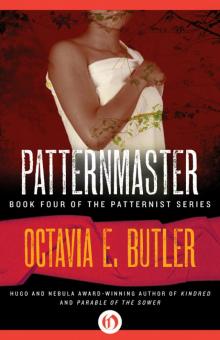 Patternmaster
Patternmaster Survivor
Survivor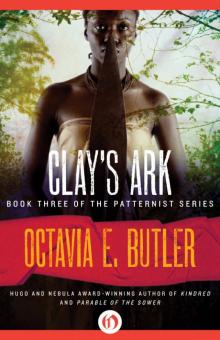 Clay's Ark
Clay's Ark Bloodchild and Other Stories
Bloodchild and Other Stories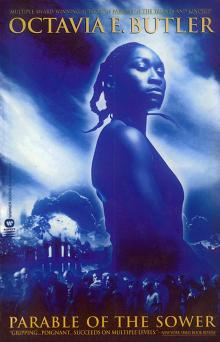 Parable of the Sower
Parable of the Sower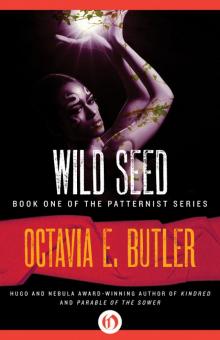 Wild Seed
Wild Seed Fledgling
Fledgling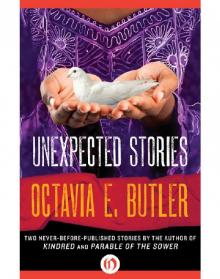 Unexpected Stories
Unexpected Stories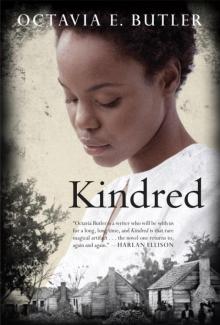 Kindred
Kindred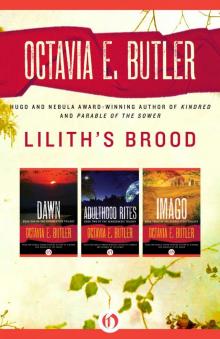 Lilith's Brood: Dawn / Adulthood Rites / Imago
Lilith's Brood: Dawn / Adulthood Rites / Imago Adulthood Rites
Adulthood Rites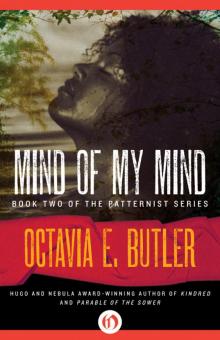 Mind of My Mind
Mind of My Mind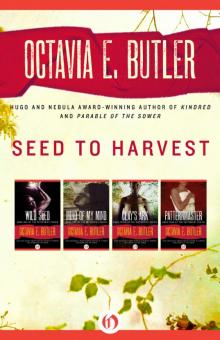 Seed to Harvest
Seed to Harvest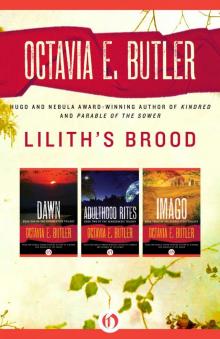 Lilith's Brood: Dawn, Adulthood Rites, and Imago (Xenogenesis Trilogy)
Lilith's Brood: Dawn, Adulthood Rites, and Imago (Xenogenesis Trilogy) Bloodchild
Bloodchild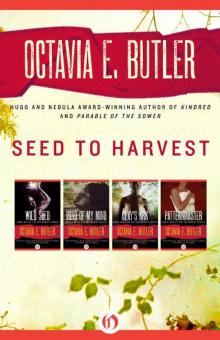 Seed to Harvest: Wild Seed, Mind of My Mind, Clay's Ark, and Patternmaster (Patternist)
Seed to Harvest: Wild Seed, Mind of My Mind, Clay's Ark, and Patternmaster (Patternist)